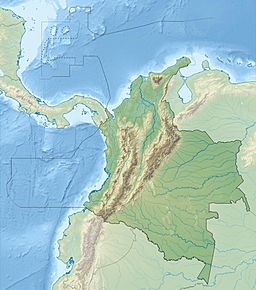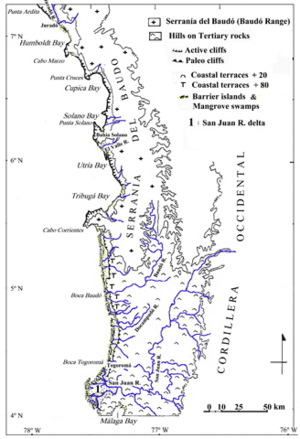Serranía del Baudó facts for kids
Quick facts for kids Serranía del Baudó |
|
|---|---|
| Highest point | |
| Peak | Alto de Buey |
| Elevation | 1,810 m (5,940 ft) |
| Dimensions | |
| Length | 375 km (233 mi) |
| Geography | |
| Country | Colombia |
| State/Province | Chocó |
| Range coordinates | 06°12′00″N 77°12′00″W / 6.20000°N 77.20000°W |
The Serranía del Baudó is a cool mountain range right on the Pacific Ocean coast of Colombia. Imagine a long line of mountains stretching along the sea! It's separated from the big West Andes mountains by a valley where the Atrato River flows. A city called Quibdó is also in this valley.
This mountain range starts near the Baudó River in the south. It then goes north and a bit west, following the coast all the way into Panama. When it's in Panama, it gets a different name: the Serranía del Sapo. Even though it looks like it ends at the Baudó River, the land actually continues south to Malaga Bay. But there, the mountains have worn down into smaller hills and marshy areas.
From a place called Cabo Corrientes up north to Punta Ardita and into Panama, the Baudó Mountains meet the ocean with really steep cliffs. These cliffs can be as tall as 70 meters (about 230 feet)! There are small dips in the coast that create tiny beaches. Some of these beaches are sandy, but most are made of pebbles or small stones.
However, near the mouths of rivers, the coast has been worn away. Here, you can find wide sandy beaches, flat areas that get covered by the tide, and even mangrove swamps. The highest point in the Serranía del Baudó is a peak called Alto de Buey, which stands 1,810 meters (about 5,938 feet) tall.
How These Mountains Formed
Geologists, who study the Earth's rocks, say that the Serranía del Baudó is like an extension of the Isthmus of Panama. Think of it as a natural bridge connecting two landmasses. These mountains started to form a very long time ago, during the Late Cretaceous and Paleocene periods.
They were created from volcanic rocks that came from the ocean floor. These rocks got squeezed and pushed together as the Nazca Plate (and later the Malpelo Plate) moved westward. These ocean plates were pushing into and under the South American Plate. This process is called plate tectonics. The area is still active today, with the Malpelo Plate moving eastward by about 3.7 centimeters (1.5 inches) each year!
Amazing Wildlife
The Serranía del Baudó is home to some unique animals. For example, a special type of frog called the Alto de Buey poison frog (its scientific name is Andinobates altobueyensis) lives here. This tiny frog is only found on the Alto del Buey mountain, which is the highest point in the range. It's a very special creature that needs its mountain home to survive!
See also
 In Spanish: Serranía del Baudó para niños
In Spanish: Serranía del Baudó para niños
 | Bessie Coleman |
 | Spann Watson |
 | Jill E. Brown |
 | Sherman W. White |



